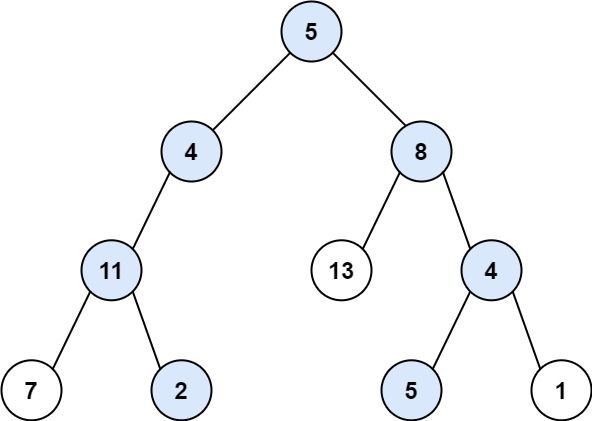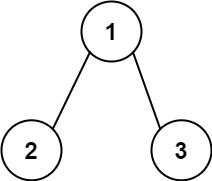给你二叉树的根节点 root 和一个整数目标和 targetSum ,找出所有 从根节点到叶子节点 路径总和等于给定目标和的路径。
叶子节点 是指没有子节点的节点。
示例 1:
输入:root = [5,4,8,11,null,13,4,7,2,null,null,5,1], targetSum = 22 输出:[[5,4,11,2],[5,8,4,5]]
示例 2:
输入:root = [1,2,3], targetSum = 5 输出:[]
示例 3:
输入:root = [1,2], targetSum = 0 输出:[]
提示:
- 树中节点总数在范围
[0, 5000]内 -1000 <= Node.val <= 1000-1000 <= targetSum <= 1000
注意:本题与主站 113 题相同:https://leetcode-cn.com/problems/path-sum-ii/
先序遍历+路径记录。
# Definition for a binary tree node.
# class TreeNode:
# def __init__(self, x):
# self.val = x
# self.left = None
# self.right = None
class Solution:
def pathSum(self, root: TreeNode, sum: int) -> List[List[int]]:
def dfs(root, sum):
if root is None:
return
path.append(root.val)
if root.val == sum and root.left is None and root.right is None:
res.append(path.copy())
dfs(root.left, sum - root.val)
dfs(root.right, sum - root.val)
path.pop()
if not root:
return []
res = []
path = []
dfs(root, sum)
return res/**
* Definition for a binary tree node.
* public class TreeNode {
* int val;
* TreeNode left;
* TreeNode right;
* TreeNode(int x) { val = x; }
* }
*/
class Solution {
private List<List<Integer>> res;
private List<Integer> path;
public List<List<Integer>> pathSum(TreeNode root, int sum) {
if (root == null) return Collections.emptyList();
res = new ArrayList<>();
path = new ArrayList<>();
dfs(root, sum);
return res;
}
private void dfs(TreeNode root, int sum) {
if (root == null) {
return;
}
path.add(root.val);
if (root.val == sum && root.left == null && root.right == null) {
res.add(new ArrayList<>(path));
}
dfs(root.left, sum - root.val);
dfs(root.right, sum - root.val);
path.remove(path.size() - 1);
}
}/**
* Definition for a binary tree node.
* function TreeNode(val) {
* this.val = val;
* this.left = this.right = null;
* }
*/
/**
* @param {TreeNode} root
* @param {number} sum
* @return {number[][]}
*/
var pathSum = function (root, sum) {
if (!root) return [];
let res = [];
function dfs(node, sum, arr) {
if (!node) return;
arr = [...arr, node.val];
if (node.val === sum && !node.left && !node.right) {
res.push(arr);
return;
}
dfs(node.left, sum - node.val, arr);
dfs(node.right, sum - node.val, arr);
}
dfs(root, sum, []);
return res;
};var res [][]int
func pathSum(root *TreeNode, sum int) [][]int {
res = [][]int{}
if root == nil {
return res
}
helper(root, sum, []int{})
return res
}
func helper(node *TreeNode, target int, ans []int) {
if node == nil {
return
}
ans = append(ans,node.Val)
target -= node.Val
if target == 0 && node.Left == nil && node.Right == nil {
tmp := make([]int,len(ans))
copy(tmp,ans)
res = append(res,tmp)
} else {
helper(node.Left, target, ans)
helper(node.Right, target, ans)
}
}class Solution {
public:
vector<vector<int>> pathSum(TreeNode* root, int target) {
vector<vector<int>> ans;
vector<int> path;
dfs(root, ans, path, target);
return ans;
}
void dfs(TreeNode* root, vector<vector<int>>& ans, vector<int>& path, int target) {
if (root == NULL) {
return;
}
target -= root->val;
path.push_back(root->val);
if (root->left == NULL && root->right == NULL) {
if (target == 0) {
ans.push_back(vector<int>(path));
}
}
dfs(root->left, ans, path, target);
dfs(root->right, ans, path, target);
path.pop_back();
}
};/**
* Definition for a binary tree node.
* class TreeNode {
* val: number
* left: TreeNode | null
* right: TreeNode | null
* constructor(val?: number, left?: TreeNode | null, right?: TreeNode | null) {
* this.val = (val===undefined ? 0 : val)
* this.left = (left===undefined ? null : left)
* this.right = (right===undefined ? null : right)
* }
* }
*/
function pathSum(root: TreeNode | null, target: number): number[][] {
const res: number[][] = [];
if (root == null) {
return res;
}
const paths: number[] = [];
const dfs = ({ val, right, left }: TreeNode, target: number) => {
paths.push(val);
target -= val;
if (left == null && right == null) {
if (target === 0) {
res.push([...paths]);
}
paths.pop();
return;
}
left && dfs(left, target);
right && dfs(right, target);
paths.pop();
};
dfs(root, target);
return res;
}// Definition for a binary tree node.
// #[derive(Debug, PartialEq, Eq)]
// pub struct TreeNode {
// pub val: i32,
// pub left: Option<Rc<RefCell<TreeNode>>>,
// pub right: Option<Rc<RefCell<TreeNode>>>,
// }
//
// impl TreeNode {
// #[inline]
// pub fn new(val: i32) -> Self {
// TreeNode {
// val,
// left: None,
// right: None
// }
// }
// }
use std::cell::RefCell;
use std::rc::Rc;
impl Solution {
fn dfs(
root: &Option<Rc<RefCell<TreeNode>>>,
mut target: i32,
paths: &mut Vec<i32>,
res: &mut Vec<Vec<i32>>,
) {
if let Some(node) = root.as_ref() {
let node = node.borrow();
paths.push(node.val);
target -= node.val;
if node.left.is_none() && node.right.is_none() && target == 0 {
res.push(paths.clone());
}
Solution::dfs(&node.left, target, paths, res);
Solution::dfs(&node.right, target, paths, res);
paths.pop();
}
}
pub fn path_sum(root: Option<Rc<RefCell<TreeNode>>>, target: i32) -> Vec<Vec<i32>> {
let mut res = vec![];
Solution::dfs(&root, target, &mut vec![], &mut res);
res
}
}// Definition for a binary tree node.
// #[derive(Debug, PartialEq, Eq)]
// pub struct TreeNode {
// pub val: i32,
// pub left: Option<Rc<RefCell<TreeNode>>>,
// pub right: Option<Rc<RefCell<TreeNode>>>,
// }
//
// impl TreeNode {
// #[inline]
// pub fn new(val: i32) -> Self {
// TreeNode {
// val,
// left: None,
// right: None
// }
// }
// }
use std::cell::RefCell;
use std::rc::Rc;
impl Solution {
fn dfs(
root: &Option<Rc<RefCell<TreeNode>>>,
mut target: i32,
paths: &mut Vec<i32>,
) -> Vec<Vec<i32>> {
let node = root.as_ref().unwrap().borrow();
paths.push(node.val);
target -= node.val;
let mut res = vec![];
// 确定叶结点身份
if node.left.is_none() && node.right.is_none() {
if target == 0 {
res.push(paths.clone());
}
paths.pop();
return res;
}
if node.left.is_some() {
let res_l = Solution::dfs(&node.left, target, paths);
if !res_l.is_empty() {
res = [res, res_l].concat();
}
}
if node.right.is_some() {
let res_r = Solution::dfs(&node.right, target, paths);
if !res_r.is_empty() {
res = [res, res_r].concat();
}
}
paths.pop();
res
}
pub fn path_sum(root: Option<Rc<RefCell<TreeNode>>>, target: i32) -> Vec<Vec<i32>> {
if root.is_none() {
return vec![];
}
Solution::dfs(&root, target, &mut vec![])
}
}

